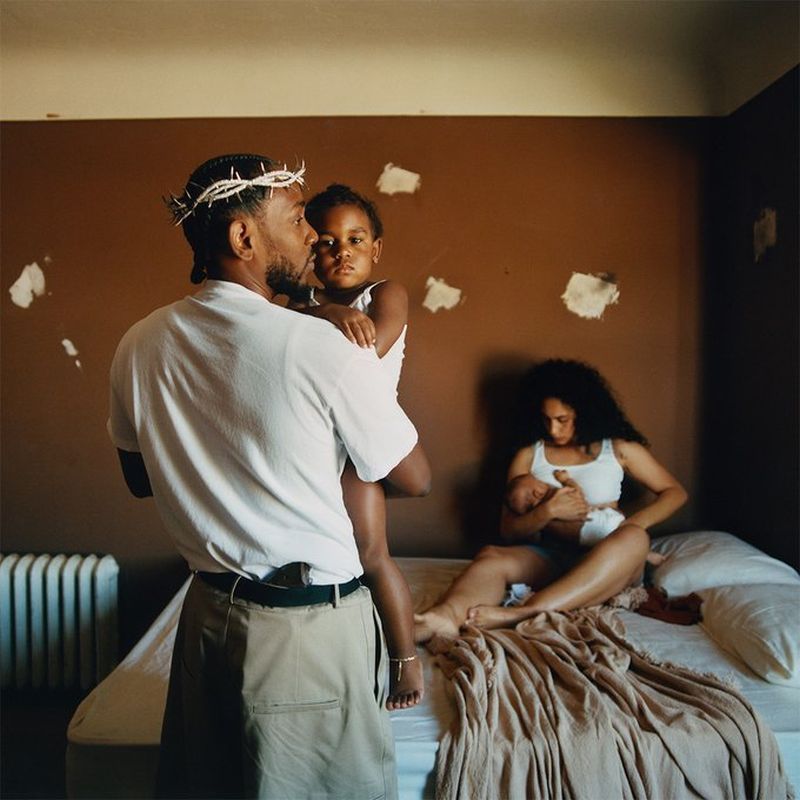

In Mr. Morale and The Big Steppers, Kendrick Lamar gives us insight into his therapy sessions. While his older works have been praised for his storytelling and societal criticism, this one turns inward. It’s raw and uncomfortable. Lamar has been “going through something,” and seems to have looked for answers that led him not just to a therapist, but to himself. What he finds is imbalance, especially in his relationships, and at the center of that, his ego. No surprise, the role of his therapist is played by Eckhart Tolle, a spiritual teacher who is most famous for his pushing to let go of said ego.
The balancing act between everything behind Lamar’s struggles and his attempts to change appears to be the guiding line throughout Mr Morale and the Big Steppers. This tension, between old and new, pride and accountability, suppression and healing, forms the heart of Mr. Morale & The Big Steppers. And while this is Lamar’s personal story, it also echoes the stories of many: how generational pain, societal expectations, and personal flaws intersect. And nowhere does this show up more clearly than in Lamar’s relationships – with his wife, his family, and ultimately, himself.
“We Cry Together”: Disbalanced Romantic Relationships
The most prominent relationship portrayed on this album is the one between Lamar and his wife, Whitney, whose voice is one of the guiding figures through the album. She is the one who sent Lamar to therapy in the first place, as revealed at the beginning of track 5, “Father Time”.
We learn that the two encountered issues in their relationship early on in the album, as Lamar talks about cheating on Whitney multiple times and developing a sex addiction (“United in Grief” Verse 2, “Worldwide Steppers” Verse 1 & 2). These issues reach a climax on track 8, “We Cry Together”, as we hear an unfiltered argument between the two (Whitney’s character is portrayed by the actress Taylour Paige however). It is a fight that leaves the listener uneasy, as the couple throws insults at each other in the most disrespectful way. All this is underlined by a chaotic melody that seems intentionally added to highlight the disturbing scene rather than to be pleasant to the listener. The fight spirals fast. He calls her a “bitch” and a “hoe”; she accuses him of being manipulative, unfaithful, and symbolic of every disappointment she’s experienced with men. Both are defensive, both are stuck in their egos, and neither is able to be vulnerable. Eckhart Tolle’s influence hovers here – the ego doesn’t want healing, it wants to win. This builds up until they both lose the plot and Lamar is willing to leave, but instead the energy turns and the couple has sex. There’s no resolution, just exhaustion. And in a twisted way, even the fight is a kind of closeness: a dysfunctional familiarity where pain becomes the only form of connection. At the beginning of the song, Whitney says, “this is what the world sounds like.” She’s not just referring to them as a couple – this is what imbalance looks like in many modern relationships. We avoid vulnerability until resentment explodes, and then we retreat into silence or distraction rather than repair. Real connection – be it with our friends, parents or partner – takes work. Throughout this album, outside of “We Cry Together” we learn that Lamar luckily takes on this mission to work on himself, in particular to save his marriage and be a good father.
“Father Time”, “Mother I Sober”: Disbalanced Family Relationships
If “We Cry Together” exposes Lamar’s brokenness in love, “Father Time” and “Mother I Sober” show where those fractures began. In “Father Time”, Lamar admits to having “daddy issues.” He recalls being raised with strict expectations: don’t cry, don’t trust, don’t show weakness. These rules helped him survive, but they also built emotional walls. In the track, Whitney suggests he try therapy, and he brushes it off, echoing the idea that “real men” don’t need help.
Still, he begins to see the cost of that mindset. The final lines – “I got daddy issues, that’s on me” – are quietly powerful. Lamar isn’t blaming anymore. He’s recognizing how pain gets passed down, and how unlearning it is his responsibility if he wants to stop the cycle.
In Mother I Sober, Kendrick Lamar reflects on witnessing his mother’s abuse as a child and the deep guilt it instilled in him. Though he was too young to intervene, he still criticizes himself. A self-judgment so intense that it manifests in dreams of his late grandmother condemning him. The song suggests the abuser was a family member, adding to the emotional weight.
His mother repeatedly asked if his cousin had ever touched him. This question planted doubt and triggered anxiety, both then and even at the time of writing. Though he hadn’t been abused, the suggestion alone left a lasting psychological impact, potentially contributing to some of his later sexual coping mechanisms. In the final verse, Lamar learns his mother only asked to protect him, hoping to prevent the cycle of trauma she endured – but in doing so, she inadvertently passed on her own pain.
Eventually, Lamar forgives everyone: his mother, his cousin, and himself. This moment – quiet, not triumphant – is one of the album’s most important acts of balance. He’s choosing peace, not to excuse, but to release what’s been weighing on him. This is how he begins to heal: not by rewriting the past, but by refusing to carry its weight forward.
Lamar’s disbalanced relationship with himself
Finally, we come to the main issue Lamar is facing on the album and in his therapy sessions: his relationship with himself, or to be more precise with his ego.
At the beginning of the album, Lamar seems mostly in defense mode. In tracks like “Worldwide Steppers” and “N95”, he points fingers outward – at other hypocrites, at the social media world, at society. But over time, his gaze turns inward. On “Father Time,” he finally says, “Guess I’m not as mature as I think – got some healin’ to do.”
This journey isn’t smooth. In “Auntie Diaries”, he attempts to show growth in how he relates to his trans family members. He acknowledges his past ignorance, but his continued use of slurs shows slow progress. Maybe that’s the point – the song captures what unlearning actually looks like: messy, clumsy, incomplete. Healing is not performative. It doesn’t always land right.
As the album continues, Lamar distances himself from the messiah image fans once projected onto him. In “Savior”, he states flat-out: “I am not your savior.” In “Mirror”, he chooses himself. And in “Crown”, he admits, “I can’t please everybody.” These refrains are not excuses. They’re Lamar shedding the pressure to be perfect. He’s stepping down from the pedestal to live more honestly.
And here, too, we see a balance – between fame and privacy, public service and personal integrity, pleasing others and preserving self. His relationship with himself reflects his relationship with the public. The more he tries to be everyone’s savior, the more he loses touch with himself. But when he stops performing and simply speaks as Lamar – flawed, confused, tired – he actually becomes more relatable.
The Ongoing Work
There’s a subtle shift in Lamar across Mr. Morale & The Big Steppers. He’s not trying to wrap everything up neatly. He’s trying to show his process – and by doing so, he asks listeners to examine their own. The tension between ego and authenticity, pain and healing, pride and accountability – it’s not unique to him. But he offers it up anyway, not as a blueprint, but as proof that facing yourself is possible.
What makes the album especially powerful is how it stretches beyond just one man. His story touches on the collective: of men raised to suppress emotions, of women burdened with protection, of generations absorbing trauma they never chose. Lamar’s healing doesn’t erase that, but it acknowledges it.
In the end, Lamar doesn’t emerge fixed. But he’s more balanced. And maybe that’s enough. Maybe that’s the point.

In Mr. Morale and The Big Steppers, Kendrick Lamar gives us insight into his therapy sessions. While his older works have been praised for his storytelling and societal criticism, this one turns inward. It’s raw and uncomfortable. Lamar has been “going through something,” and seems to have looked for answers that led him not just to a therapist, but to himself. What he finds is imbalance, especially in his relationships, and at the center of that, his ego. No surprise, the role of his therapist is played by Eckhart Tolle, a spiritual teacher who is most famous for his pushing to let go of said ego.
The balancing act between everything behind Lamar’s struggles and his attempts to change appears to be the guiding line throughout Mr Morale and the Big Steppers. This tension, between old and new, pride and accountability, suppression and healing, forms the heart of Mr. Morale & The Big Steppers. And while this is Lamar’s personal story, it also echoes the stories of many: how generational pain, societal expectations, and personal flaws intersect. And nowhere does this show up more clearly than in Lamar’s relationships – with his wife, his family, and ultimately, himself.
“We Cry Together”: Disbalanced Romantic Relationships
The most prominent relationship portrayed on this album is the one between Lamar and his wife, Whitney, whose voice is one of the guiding figures through the album. She is the one who sent Lamar to therapy in the first place, as revealed at the beginning of track 5, “Father Time”.
We learn that the two encountered issues in their relationship early on in the album, as Lamar talks about cheating on Whitney multiple times and developing a sex addiction (“United in Grief” Verse 2, “Worldwide Steppers” Verse 1 & 2). These issues reach a climax on track 8, “We Cry Together”, as we hear an unfiltered argument between the two (Whitney’s character is portrayed by the actress Taylour Paige however). It is a fight that leaves the listener uneasy, as the couple throws insults at each other in the most disrespectful way. All this is underlined by a chaotic melody that seems intentionally added to highlight the disturbing scene rather than to be pleasant to the listener. The fight spirals fast. He calls her a “bitch” and a “hoe”; she accuses him of being manipulative, unfaithful, and symbolic of every disappointment she’s experienced with men. Both are defensive, both are stuck in their egos, and neither is able to be vulnerable. Eckhart Tolle’s influence hovers here – the ego doesn’t want healing, it wants to win. This builds up until they both lose the plot and Lamar is willing to leave, but instead the energy turns and the couple has sex. There’s no resolution, just exhaustion. And in a twisted way, even the fight is a kind of closeness: a dysfunctional familiarity where pain becomes the only form of connection. At the beginning of the song, Whitney says, “this is what the world sounds like.” She’s not just referring to them as a couple – this is what imbalance looks like in many modern relationships. We avoid vulnerability until resentment explodes, and then we retreat into silence or distraction rather than repair. Real connection – be it with our friends, parents or partner – takes work. Throughout this album, outside of “We Cry Together” we learn that Lamar luckily takes on this mission to work on himself, in particular to save his marriage and be a good father.
“Father Time”, “Mother I Sober”: Disbalanced Family Relationships
If “We Cry Together” exposes Lamar’s brokenness in love, “Father Time” and “Mother I Sober” show where those fractures began. In “Father Time”, Lamar admits to having “daddy issues.” He recalls being raised with strict expectations: don’t cry, don’t trust, don’t show weakness. These rules helped him survive, but they also built emotional walls. In the track, Whitney suggests he try therapy, and he brushes it off, echoing the idea that “real men” don’t need help.
Still, he begins to see the cost of that mindset. The final lines – “I got daddy issues, that’s on me” – are quietly powerful. Lamar isn’t blaming anymore. He’s recognizing how pain gets passed down, and how unlearning it is his responsibility if he wants to stop the cycle.
In Mother I Sober, Kendrick Lamar reflects on witnessing his mother’s abuse as a child and the deep guilt it instilled in him. Though he was too young to intervene, he still criticizes himself. A self-judgment so intense that it manifests in dreams of his late grandmother condemning him. The song suggests the abuser was a family member, adding to the emotional weight.
His mother repeatedly asked if his cousin had ever touched him. This question planted doubt and triggered anxiety, both then and even at the time of writing. Though he hadn’t been abused, the suggestion alone left a lasting psychological impact, potentially contributing to some of his later sexual coping mechanisms. In the final verse, Lamar learns his mother only asked to protect him, hoping to prevent the cycle of trauma she endured – but in doing so, she inadvertently passed on her own pain.
Eventually, Lamar forgives everyone: his mother, his cousin, and himself. This moment – quiet, not triumphant – is one of the album’s most important acts of balance. He’s choosing peace, not to excuse, but to release what’s been weighing on him. This is how he begins to heal: not by rewriting the past, but by refusing to carry its weight forward.
Lamar’s disbalanced relationship with himself
Finally, we come to the main issue Lamar is facing on the album and in his therapy sessions: his relationship with himself, or to be more precise with his ego.
At the beginning of the album, Lamar seems mostly in defense mode. In tracks like “Worldwide Steppers” and “N95”, he points fingers outward – at other hypocrites, at the social media world, at society. But over time, his gaze turns inward. On “Father Time,” he finally says, “Guess I’m not as mature as I think – got some healin’ to do.”
This journey isn’t smooth. In “Auntie Diaries”, he attempts to show growth in how he relates to his trans family members. He acknowledges his past ignorance, but his continued use of slurs shows slow progress. Maybe that’s the point – the song captures what unlearning actually looks like: messy, clumsy, incomplete. Healing is not performative. It doesn’t always land right.
As the album continues, Lamar distances himself from the messiah image fans once projected onto him. In “Savior”, he states flat-out: “I am not your savior.” In “Mirror”, he chooses himself. And in “Crown”, he admits, “I can’t please everybody.” These refrains are not excuses. They’re Lamar shedding the pressure to be perfect. He’s stepping down from the pedestal to live more honestly.
And here, too, we see a balance – between fame and privacy, public service and personal integrity, pleasing others and preserving self. His relationship with himself reflects his relationship with the public. The more he tries to be everyone’s savior, the more he loses touch with himself. But when he stops performing and simply speaks as Lamar – flawed, confused, tired – he actually becomes more relatable.
The Ongoing Work
There’s a subtle shift in Lamar across Mr. Morale & The Big Steppers. He’s not trying to wrap everything up neatly. He’s trying to show his process – and by doing so, he asks listeners to examine their own. The tension between ego and authenticity, pain and healing, pride and accountability – it’s not unique to him. But he offers it up anyway, not as a blueprint, but as proof that facing yourself is possible.
What makes the album especially powerful is how it stretches beyond just one man. His story touches on the collective: of men raised to suppress emotions, of women burdened with protection, of generations absorbing trauma they never chose. Lamar’s healing doesn’t erase that, but it acknowledges it.
In the end, Lamar doesn’t emerge fixed. But he’s more balanced. And maybe that’s enough. Maybe that’s the point.



